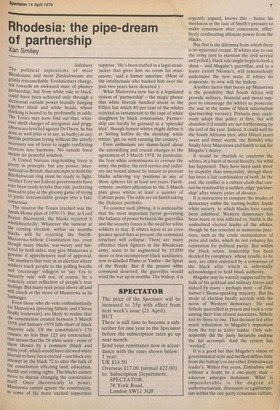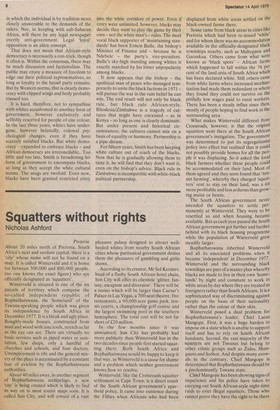Rhodesia: the pipe-dream of partnership
Xan Smiley
Salisbury The political aspirations of most Rhodesians and most Zimbabweans are grimly irreconcilable. Evolutionary change, not towards an awkward state of phoney Partnership, but from white rule to black, could have been achieved only through a dictatorial outside power brutally banging together black and white heads, whose thinking is bound to be profoundly at odds. The Tories may soon find out that, whatever shrill charges of arrogance and priggishness are levelled against Dr Owen, he has done as well (that is to say, as badly) as any British politician trying without the utterly necessary use of force to juggle conflicting interests into harmony. No outside force Means no peaceful solution.
A United Nations ring-holding force is Pretty in principle, but any power, international or British, that attempts to hold the Rhobabwean ring must be ready to fight. Neither Tory nor Labour governments have ever been ready to take that risk, preferring instead to play at the gloomy game of trying to jostle irreconcilable groups into a fake consensus.
The nearest the Tories reached was the Smith-Home plan of 1970-71. But, as Lord Pearce discovered, the blacks rejected it Wholeheartedly. Whatever the turnout at the coming election, within six months blacks will be rejecting the SmithMuzorewa-Sithole Constitution too, even though many blacks, war-weary and battered by both sides, may give Muzorewa a genuine if apprehensive nod of approval. The numbers that vote in an election where soldiers truck people to the polling booths and 'encourage' villagers to 'say Yes to Majority rule' will not, of course, be a remotely exact reflection of people's true feelings. But many seek peace above all and Still clutch at the straw of Muzorewa as its harbinger. Even those who do vote enthusiastically for Muzorewa (proving Sithole and Chirau finally irrelevant), are likely to realise that the constitution created between 3 March 1978 and January 1979 falls short of black Majority rule. Of the constitution's 170 clauses, no less than 123 are entrenched: that means that the 28 white seats — none of them chosen by a common (black and White) roll, which would have allowed white liberals to have been elected —can block any attempt by the black 72 to alter the bulk of the constitution affecting land, education, health and voting rights. The blacks cannot move to discuss changing the constitution itself. Once theoretically in power. Muzorewa cannot ignore the constitution, as some of his more excited supporters suppose. 'He's been stuffed in a legal straitjacket that gives him no room for manoeuvre,' said a former associate. (Most of the intellectuals who backed him over the past two years have deserted.) What Muzorewa now has is a legislated system of 'partnership' — the magic phrase that white liberals bandied about in the Fifties but which 80 per cent of the whites rejected as tantamount to the rape of white daughters by black communists. Partnership can hardly be gainsaid as a 'splendid idea', though honest whites might define it as 'letting kaffirs do the shouting' while whites 'get on with running the country.'
Even enthusiasts are shame-faced about the astonishing and crucial changes to the agreement of 3 March 1978. In particular, the four white commissions to oversee the army, the police, the civil service and judiciary are bound almost by statute to prevent blacks achieving top positions in any of those spheres for at least ten years. Furthermore, another alteration to the 3 March plan gives whites at least a quarter of Cabinet posts. The odds are on Smith taking the Defence portfolio.
To counter such jibbing, it is undeniable that the most important factor governing the balance of power between the guerrillas and the security forces is the need for white soldiers to stay. If whites leave at an even greater speed than at present, the command structure will collapse. There are many effective black fighters in the Rhodesian army, soon to be augmented by 10,000 more or less incompetent black auxiliaries, now re-labelled Pfumo re Vanhu — the Spear of the People. But if the present white command deserted, the guerrillas would wind the war up in months. The bishop, it is cogently argued, knows this — hence his meekness in the face of Smith's pressure to make concession after concession, effectively confiscating ultimate power from the blacks.
But that is the dilemma from which there is no episcopal escape. If whites stay to run the army (not to mention the civil service and polic4 black rule might begin to look a sham — and Mugabe's guerrillas, and to a lesser extent Nkomo's, will remorselessly undermine the new state. If whites do evaporate, So now will the bishop.
Another factor that buoys up Muzorewa is the possibility that South Africa will provide military, financial and moral support to encourage the whites to prosecute the war in the name of black nationalism (partnership version). Pretoria may cauti ously adopt that policy at first, but will abandon it if results are not forthcoming by the end of the year. Indeed, it could well be the South Africans (not, after fifteen years sweet and bitter words, the British) who finally force Muzorewa and Smith to ask for Mugabe's mercy.
It would be churlish to condemn the whites, in a burst of moral ferocity, for what has happened. They have been sunk more by stupidity than immorality, though there has been a fair combination of both. In the end, the conflict is a culture-clash that cannot be resolved by a sudden, edgy 'partnership' after ninety years of divorce.
It is instructive to compare the modes of democracy within the warring bodies. Inside white society, to which blacks have rarely been admitted, Western democracy has been more or less adhered to. Smith is the undoubted elected leader of the whites, though he has resorted to numerous practices, such as the crude manipulation of press and radio, which do not enhance his reputation for political purity. But within the black arena, leadership has been decided by conspiracy, whose results, to be sure, are often endorsed by a consensus of the black elite which is informally acknowledged to hold black authority.
Mugabe may be warmly supported by the bulk of his political and military forces and indeed by many — perhaps most — of Zim babwe's Shona-speaking majority. But his mode of election hardly accords with the norm of Western democracy. He and Sithole quarrelled in prison and took a vote among their four closest associates. Sithole lost by three to one. That decision led after much tribulation to Mugabe's imposition from the top as ZANU leader. Only subsequently did the party hierarchy endorse the fait accompli. And the system has 'worked'.
It is a good bet that Mugabe's vision of governmental style and method differs little from the bishop's or any other Zimbabwean leader's. Within five years, Zimbabwe will without a doubt be a one-party state — whoever emerges dominant. What is imponderable is the degree of authoritarianism, discussion or egalitarianism within the one-party consensus culture, in which the individual is by tradition more closely answerable to the demands of the rulers. Nor, in keeping with sub-Saharan Africa, will there be any legal newspaper overtly anti-government. Legal 'loyal' opposition is an alien concept.
That does not mean that African-style democracy is necessarily a con-trick, though it often is. Within the consensus, there may be much discussion and factionalism. The public may enjoy a measure of freedom to edge out their political representatives, so long as loyalty to the broad party remains. But by Western norms, that is clearly democracy with clipped wings and body probably trussed too.
It is hard, therefore, not to sympathise with whites accustomed to another form of government, however exclusively and selfishly reserved for people of one colour. In the last three years, whites have undergone, however belatedly, colossal psychological changes, even if they have scarcely satisfied blacks. But white democracy — expanded to embrace blacks — and African democracy are irreconcilable,. Too little and too late, Smith is broadening his form of government to encompass blacks, so long as they accept the white cultural norms. The snags are twofold. Even now, blacks have been granted restricted entry into the white corridors of power. Even if entry were unlimited, however, blacks may decide they want to play the game by their own — not the white man's — rules. The most vocal black supporter of 'maintaining standards' has been Ernest Bulle, the bishop's Minister of Finance and — because he is Ndebele — the party's vice-president. Bulle's sky-high standing among whites is exactly matched by his bitter unpopularity among blacks.
It now appears that the bishop — the apolitical man of peace who managed temporarily to unite the black factions in 1971 — will pursue the war in the vain belief he can win. The end result will not only be black rule, but black rule African-style. Rhodesia/Zimbabwe is a tragedy of cultures that might have coexisted — as in Kenya — so long as one is clearly dominant. But under present and historical circumstances, the cultures cannot mix on a basis of equality or harmony. Partnership is a pipe-dream.
For fifteen years, Smith has been keeping white culture out of reach of the blacks. Now that he is gradually allowing them to taste it, he will find that they don't want it, even on the bishop's advice. Black rule in Zimbabwe is incompatible with white-black political partnership.







































 Previous page
Previous page